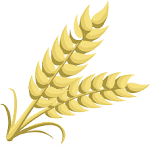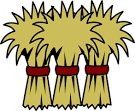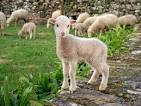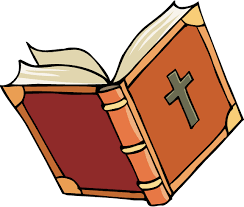Matthew 12:1 – At that time Jesus went through the grain fields on the Sabbath. His disciples were hungry, and they began to pluck heads of grain and to eat.
In chapter 12, we find a series of incidents that show the growing bitterness and antagonism of the religious leaders against Jesus. Sadly, those who were the guardians of the old covenant refused to embrace the new and better covenant that God wanted them to experience.

The chapter begins with two narratives that both center on the Sabbath. The first begins with Jesus and his disciples walking through a field, eating some grain.
This same narrative is found in Luke chapter 6. Luke tells us that this particular Sabbath was between Passover and the Feast of Pentecost. This means the time frame is somewhere between the end of the wheat harvest and the beginning of the barley harvest. The grain most likely referenced here is barley, even though your translation may say 'corn'.
Matthew 12:2 – But when the Pharisees saw it, they said to him, "Look, your disciples are doing what is not lawful to do on the Sabbath."
First, take note of the true complaint of the Pharisees. The contention raged around the Sabbath, not the barley. It was not against the law to eat a handful of someone else's grain:
Deuteronomy 23:25 – If you go into your neighbor's standing grain, you may pluck the ears with your hand, but you shall not put a sickle to your neighbor's standing grain.
At this point, we need to stop and make a distinction between the Law and the tradition of the elders.
The Law was the covenant given to Moses by God on Mount Sinai. It included the 10 commandments as well as other laws regarding property, marriage, individual rights, punitive damages, etc. 'Keeping the Sabbath' was one of the 10 commandments. It meant that you had to rest from regular work on that day and meditate on God.
The tradition of the elders was NOT law. It was a set of rules that the elders developed over time. These man-made rules were stricter than the actual law. The original intent of these rules was to stop you from crossing the line into actual sin. The problem is that the religious leaders became fanatical about these regulations. Eventually, they considered them to be more important than the law they were supposed to protect!
In this narrative, we find the Pharisees accusing Jesus and the disciples of reaping or working on the Sabbath, which was a sin according to the old covenant:
Exodus 35:2 – Six days work shall be done, but on the seventh day you shall have a Sabbath of solemn rest, holy to the Lord. Whoever does any work on it shall be put to death.
When we think of 'reaping' in context of the Old Testament, what comes to mind? The work of reaping the barley (or any other grain) began at sun up, continued through the heat of the day, and ended only at dark. This went on 6 days a week, until the harvest was all gathered. It was a backbreaking process that started with taking a scythe or sickle and using your whole upper body to slash the stalks down.

Then other people would bend down, pick the stalks up, and lean them together to dry. (How would you like to do that all day long?)
Eventually, the stalks must be transported to the threshing floor, where an ox and a sled were used to separate the grain from the stalk. Then, someone would use a kind of pitchfork to throw the stuff up into the air, where the chaff would blow away and the grain would fall into a pile. Finally, it was gathered up and stored for the winter months.
So let me ask you – does that sound like work? It sure does to me! I bet I would be exhausted after about 30 minutes of that!
Let's compare that process to what Jesus and the disciples did. They walked into someone's field, picked off a few heads of grain in their hand, rubbed them together to remove the outer shell, and popped them into their mouths for a quick lunch. The whole event probably lasted less than 15 minutes, and I seriously doubt that any of them even broke a sweat.
So, we find that Jesus DID NOT break the Sabbath law given by God. He ignored the tradition of the elders, which was never a real law in the first place. The accusations of the Pharisees were false.
Jesus and his disciples were just eating a quick, much needed lunch. By this time in his ministry, people were no doubt closely following Jesus wherever he went. Great crowds were coming to him all day long looking for healing and deliverance. There was no time for Jesus and the disciples to even pack a lunch, much less sit down for a meal. Hence, they were grabbing a handful of barley in order to keep up their strength and continue ministering to the people.
Matthew 12:3-4 – He said to them, "Have you not read what David did when he was hungry, and those who were with him: how he entered the house of God and ate the bread of the Presence, which it was not lawful for him to eat nor for those who were with him, but only for the priests?"
The tradition of the elders had gone way beyond the extent of the Law. This was the case with most of the traditions; they had become a serious burden and a snare to the Jewish people.
Jesus has a lot to say about these traditions throughout his ministry on earth. In this instance, he is going to denounce the tradition and show the Pharisees that the Law allows works of necessity and works of mercy to occur on the Sabbath day.
How will Jesus prove to the religious leaders that the law allowed works of necessity and mercy on the Sabbath? By using scriptural precedents! Jesus begins with David in 1 Samuel 21. Let's review the situation:
David is married to King Saul's daughter, Michael, and they live in the palace. David is serving in the army, even though he has already been anointed as the next king. Through his friend Jonathan, he discovers that King Saul is coming to kill him, so he immediately flees. In his haste, he left with nothing - no weapons, no clothes, no food. He seeks help at the tabernacle from Ahimelech the priest.
When David asks the priest for a sword, the priest gives him the sword of Goliath (which was David's anyway. The priest was just holding it for him).
When David asks the priest for food, the priest says that there is nothing available, except the bread from the table of showbread also called the bread of Presence.
This bread actually consisted of 12 loaves (one for each of the tribes of Israel), which were baked once a week and set on the table of showbread, in the Holy Place. When the new bread was brought in, the week-old bread was given to the priests for food. It was to be eaten only by them, and it had to be eaten in a holy place.
But the priest, seeing David's necessity, gave him the bread.
Do you see the comparison between David and Jesus?
- David has been anointed as king, but is not yet serving in that capacity. Jesus is the same.
- Those with David are hungry; they have set upon an urgent mission without taking time to pack food. Jesus and his followers are also on an urgent mission – to spread the gospel – and did not take time to pack food.
- Saul and Doeg the Edomite were anxiously looking for David to condemn him. Likewise, the Pharisees were looking for reasons to condemn Jesus and the disciples.
If only the Pharisees had been looking at the disciples needs instead of their faults! They could have blessed the disciples by providing food for them. They missed an opportunity to meet a need/do a good work because they were focused on their own man-made traditions.
My point is that through scriptural precedent Jesus is proving that Sabbath observance must bend to personal necessities.
Matthew 12:5 – "Or have you not read in the Law how on the Sabbath the priests in the temple profane the Sabbath and are guiltless?"
Jesus does not rest his case on a single event, he now gives another instance where works of necessity are performed on the Sabbath. As a side note, did you notice that the Pharisees offered no scriptural basis for their traditions?

When the Sabbath rolled around, the priests did not get the day off. In fact, they had more work to do on that day than any other because additional lambs were sacrificed on the Sabbath. (See Numbers 28:9-10)
Think about the job of the priests. They had to slaughter multiple animals, drain out the blood, skin them, gut them, cut them up, build a fire on the brazen altar and offer the sacrifice. Blood had to be sprinkled on the altar. Ashes had to be gathered and removed. They also had to bake the fresh bread for the table of showbread, fill and light the lamp stand and offer incense, etc. Sounds to me like a lot of hard work.Yet, this was not considered breaking the Sabbath. Why?
Because it was done in the temple, as part of divine service. The sanctity of the temple and its service exempted it from the operation of the law. God not only permitted this work, but he directed it. Clearly, all work was not unlawful on the Sabbath.
So, what Jesus and his disciples did (eating the grain) was not only acceptable because they were in need, but also because they were engaged in divine service – the preaching of the Kingdom of Heaven to sinners.

Jesus concludes his case with a slam dunk closing argument:
Matthew 12:6 – "I tell you, something greater than the temple is here."
The Pharisees delighted in the temple and in its rituals. What they failed to realize was that Jesus the Messiah was the fulfillment of all that the temple stood for. As John the Baptist so clearly pointed out, he was the Lamb of God sent to take away the sins of the world! Not only is he the Lamb of God, he is Lord of the Sabbath! (See verse 8).
If the Lord of the Sabbath (the One who was the very fulfillment of all temple service), sanctioned the activities of the disciples, who were the Pharisees to question it?
Jesus rebukes the religious leaders who had rejected him as Lord and Messiah.
Matthew 12:7-8 – "And if you had known what this means, 'I desire mercy, and not sacrifice,' you would not have condemned the guiltless. For the Son of Man is lord of the Sabbath."
Jesus now gets to the root of the problem, which is the hearts of the Pharisees. If they had grasped the true meaning of the religion they professed, they would have known that mercy and love were the true foundations of religion, not just ritual worship done for the sake of ritual.
If they operated under the guidelines of mercy and love, they would have seen the hunger of the disciples and responded to that need, assisting them in their labors for God.
Let me give you a 'heads up' here:
I can tell you from first- hand experience that whenever you move out into ministry for God, you will find both disciples and Pharisees.
The disciples are the ones who see your vision. They are the ones who understand how your ministry strengthens and encourages the body of Christ. They see how the gospel touches the lives and hearts of lost or hurting people through your ministry. They are happy to assist and partner with you to see people come into the Kingdom of Heaven. They encourage, support and strengthen you along the way.
But, alas, there will also be Pharisees. These are people who look for reasons to criticize your ministry. They tell you how they could have done it so much better! They never offer any tangible help, nor do they encourage or strengthen you in your labors. In fact, they sometimes tell you how unqualified you are for the job you are doing!
Don't let the Pharisees influence you. Stand firm, and continue to do as God has directed you to do, until he tells you to cease and desist. He is the one we answer to!
Matthew 12:9-10 – He went on from there and entered their synagogue. And a man was there with a withered hand. And they asked him, "Is it lawful to heal on the Sabbath?"
We began chapter 12 by saying that Jesus was going to denounce tradition and show the Pharisees that the Law allows works of necessity and works of mercy to occur on the Sabbath day.
The last instance focused on 'works of necessity'. This narrative focuses on 'works of mercy'.
Jesus and his disciples have now entered into the synagogue. Among the worshippers is a man with a withered hand. It seems as though he had been purposely placed there by the Pharisees.
It's a very strange and pathetic circumstance, if you think about it. They are using this man as bait to try and draw out Christ's compassion. This means that they believed Jesus could to miracles and they want him to perform one, but not for confirmation of their faith or out of pity for the afflicted man. They want to see the miracle in order to accuse Jesus of breaking the law (specifically working on the Sabbath). Hatred and malignity become the motivations for seeing a miracle. How weird is that?
When religion ceases to be a matter of the heart and only exists for outward observance, absurdity and cruelty are the result. It should be noted that the Pharisees are looking for material that they can use in a legal process before the local tribunal. And once again, it is the tradition of the elders, not the actual law that a healing would have broken.
Matthew 12:11-12 – He said to them, "Which one of you who has a sheep, if it falls into a pit on the Sabbath, will not take hold of it and lift it out? Of how much more value is a man than a sheep! So it is lawful to do good on the Sabbath."
Jesus appeals to their natural sense of compassion to confirm that works of mercy are permitted on the Sabbath.
It was a regular and accepted practice among the Jews to rescue an animal that had fallen into a pit or a ditch on the Sabbath. No one would have condemned them for doing so.

Yet, human beings are much more valuable than animals! Humans are made in the image of God. Jesus came to suffer and die so that humans could become the sons and daughters of God and enjoy everlasting life with him.
Since a human being is infinitely more valuable than a sheep, how much more should we be assisting people in their time of need? Clearly, showing mercy or relieving the suffering of others did not violate the Sabbath rest.
Notice that Jesus does not say 'it is lawful to heal' on the Sabbath, but 'it is lawful to do good'. This widens the scope of his statement to cover an infinite number of good works, not just healing.
Matthew 12:13 – Then he said to the man, "Stretch out your hand." And the man stretched it out, and it was restored, healthy like the other.
Notice the perfection with which Jesus heals this man: By healing him with just a word, both the Sabbath and the tradition of the elders remained unbroken. The religious leaders are foiled in their attempt to bring legal charges against Jesus.
At the same time, Jesus proves his divinity with this miracle. Who but God could heal with just a word? The mercy and power of God are both demonstrated, but they fell on the blind eyes of the Pharisees. Rather than draw them to God, it hardened their hearts. They left with more hostility than they came with.
Matthew 12:14 – But the Pharisees went out and conspired against him, how to destroy him.
Here we find the most influential, educated religious leaders of the day actually plotting to kill someone. Those who were up in arms over breaking the Sabbath seemed totally unfazed by the prospect of murder!
What happened? How did these men find themselves in a position where they are literally fighting against God?
I think the roots of their unbelief lay in their pride. The religious leaders were revered and respected by the rest of the Jews because they knew more about the covenant than anyone else. After all, the covenant defined who they were as a people. It gave them their national identity. Yet, the leaders were poor stewards of the knowledge they had. Instead of assisting the 'ordinary' Jews in understanding and obeying the covenant, they made it much harder for them to abide by the law.
Matthew 23:4 – They [the Scribes and Pharisees] tie up heavy burdens, hard to bear, and lay them on people's shoulders, but they themselves are not willing to move them with their finger.
Then, they portrayed themselves to be in a special class that was more spiritual and more holy because of their knowledge of the law. By doing this, they increased their own power, influence and authority. They came to see themselves as actually being better than their fellow Jews.
But then Jesus came along. Ordinary citizens could hear and understand the word of God. They marveled at the teaching of Jesus. They saw miracles that testified that Jesus was the Messiah. They no longer had any reason to hold the Pharisees in such high honor.
So the Pharisees were losing popularity, honor, influence and power. That caused their pride to rise up in rebellion. Pride brought along some of its friends: envy and hatred. Because they believed Jesus had caused them to lose what they held so dear, he became the object of their fury.
They were so blinded by their pride and envy, they did not use their reason. If they had objectively looked at the scriptures they were stewarding, they would have known that Jesus was the Christ. Instead, they were looking for a way to kill him!
Matthew 12:15-16– Jesus, aware of this, withdrew from there. And many followed him, and he healed them all and ordered them not to make him known.
Jesus did not withdraw out of fear. He operated in the fullness of the Holy Spirit and he was just as courageous at the moment he withdrew as he was when he voluntarily presented himself to die.
He withdrew because his 'hour had not yet come'. Since Jesus still had a lot of work to accomplish before his death, he prudently withdrew, preserving his life for that further work.
Even though Jesus withdrew from that place, he went to another district and preached the gospel there, healing all who needed it. The religious leaders could not stop the gospel message.
Matthew 12:17-18 - This was to fulfill what was spoken by the prophet Isaiah: "Behold, my servant whom I have chosen, my beloved with whom my soul is well pleased. I will put my Spirit upon him, and he will proclaim justice to the Gentiles.
Verses 17 through 21 are a translation or declaration of Isaiah 42:1-4. Matthew does not quote that scripture verbatim, but he captures the essence or intent of the verses. Please read the actual scripture, if you wish.

Keep in mind that the Pharisees (and indeed many of the disciples at first) were expecting the Messiah to come and reveal himself as a conquering hero. They expected him to come, raise an army, attack the Romans and set up his kingdom. While it is true that Jesus will someday return to earth to set up his kingdom, that is still a future event.
His first coming was as a servant. He is called the Lord's servant because he took upon himself the form of a servant and became obedient unto death, for the sake of our salvation.
Philippians 2:7-8 - ...but made himself of no reputation, and took upon him the form of a servant, and was made in the likeness of men: and being found in fashion as a man, he humbled himself, and became obedient unto death, even the death of the cross.
In being a servant, he brings forth justice to all men, even the Gentiles. The word for 'justice' means law, commands, doctrine or truth. Here it is understood to mean that Jesus would reveal the gospel or the full truth of the new dispensation to all men, Jews and Gentiles alike.
Matthew 12:19-21 – He will not quarrel or cry aloud, nor will anyone hear his voice in the streets; a bruised reed he will not break, and a smoldering wick he will not quench, until he brings justice to victory; and in his name the Gentiles will hope."
These two verses find their fulfillment in the events of this narrative about the man with the withered hand. Jesus did not quarrel or strive with the Pharisees; he meekly silenced them then quietly withdrew from their presence. Unlike the Pharisees, he does not seek publicity or popularity but only to do the will of God.
The phrases 'bruised reed' and 'smoldering wick' are symbolic of weakness/feebleness/helplessness. The images show the gentleness with which Jesus brings the truth of the gospel into the hearts of his followers. He is not pround, unforgiving or cruel, like the religious leaders. He is not harsh or unkind. Rather, he gives strength, healing and pardon, both in the physical and spiritual realms. He will take time to flame the smallest ember of holiness into a blaze, using the oil of grace.
Rest assured – he will be victorious in bringing the truth of the gospel message to the earth. The gospel will never be vanquished or subdued, no matter who or what fights against it for Jesus will conquer!
Let me offer you some encouragement:
The Pharisees were hyper-vigilant in looking for things they should not do. I imagine they had giant scrolls full of things that were prohibited, because they considered them sinful. While it is true that we 'commit' sins, the bible tells us that we also 'omit' sins. That means if we see some good work that needs to be done and we ignore it, we are sinning!
James 4:17 - Therefore to him that knows to do good, and does it not, to him it is sin.
How often do we go about our business never paying any attention to those around us? Worse yet, how many people (besides me) have purposely walked through the store or the park with their head down because they didn't want to see or notice or speak to anyone around them? I encourage all of us to begin noticing those around us and to begin looking for opportunities to strengthen and give hope to others.
Let me offer you some relief:
In this passage, Jesus talks about sheep. He goes on to say, "Of how much more value is a man than a sheep!" I want you to understand that you are incredibly valuable in God's sight. Furthermore, your value is not based on what you have accomplished for God, or how many/few sins you have committed.
Therefore, your value does not increase if you do more good works and it does not decrease when you make a mistake. Your value is based on the simple fact that God made you, and he loves you. So breathe a sigh of relief. You don't have to 'perform' well in order to be valuable to God!
Let me offer you some strength:
Sometimes it seems as though our world is filled with all manner of drama and chaos like lethal flu viruses, plunging stock markets, job losses and ugly political antics. Sometimes we get weary of it all. But don't lose hope. No matter what opposition or chaos the enemy brings to our door, he has no real power over us because Jesus is our refuge and strength during times of trouble!
Psalm 46:1-2 – God is our refuge and strength, a very present help in trouble. Therefore, we will not fear [even] though the earth gives way.
